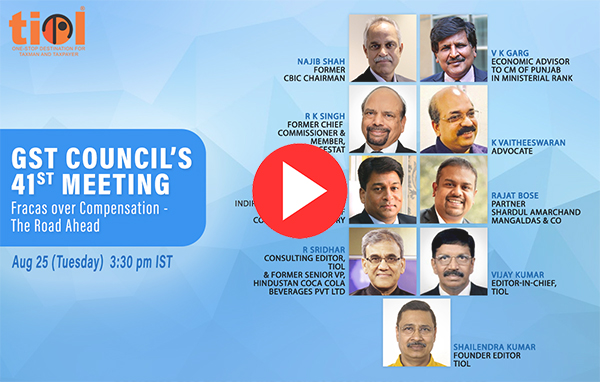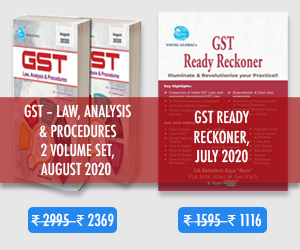|
SERVICE TAX
2020-TIOL-1434-CESTAT-KOL
Mahanadi Coalfields Ltd Vs CCGST & CE
ST - The assessee, a PSU is engaged in business of coal mining - Apart from payment of central excise duty on coal, they are also liable to deposit service tax under category of 'Security Service' under Reverse Charge Mechanism as service recipient - For the period 2012-13, assessee reimbursed the service tax amount to the security service provider - The Department did not take into cognizance the challans submitted by service provider evidencing payment of entire service tax amount - The demand of service tax was thus confirmed by adjudicating authority together with interest and equivalent penalty - On perusal of calculation details submitted by assessee before both the authorities, it is found that the payment is duly supported by way of confirmation from CBEC website which is on record - Neither the tax calculation details nor the payment confirmation has been disputed by both the authorities below - The only reason assigned by lower authority for not accepting the said challans is that same did not bear legible bank seal - Since the said challans are supported with CBEC website payment confirmation, there is no reason to doubt the payment of tax - There is no reason to confirm the demand when service tax stands already paid and there is no loss of revenue to the Exchequer - The impugned order is therefore set aside: CESTAT
- Appeal allowed: KOLKATA CESTAT
CENTRAL EXCISE
2020-TIOL-1432-CESTAT-DEL
Rupam Conductors Pvt Ltd Vs Pr Addl Director General
CX - The appeals are filed by assessee and Mrs. Manisha H. Mehta, Director, for the waiver of penalties imposed under Rule 26(2)(i) and Rule 26(2)(ii) of CER, 2002 - The penalties were imposed on the allegation that the assessee have issued invoices to M/s. Chandra Protecto Limited for supply of Copper Conductors, Copper Rods and Copper Wires whereas only invoices were issued without supplying the physical materials - It is the claim of assessee that they have produced various documents and submissions however, the Adjudicating Authority has not properly dealt with the documents and submissions made by them - Therefore, there is a violation of principles of natural justice - Irrespective of any grave nature of offence, if the principles of natural justice are not followed, the order will not sustain - Accordingly, the impugned order is set aside and the matter is remanded to the Adjudicating Authority for passing a fresh order after considering all the documents and submissions thereon made by assessee: CESTAT
- Matter remanded: DELHI CESTAT
CUSTOMS
2020-TIOL-1618-HC-DEL-CUS
Apeejay Infra Logistics Pvt Ltd Vs UoI
Cus - Petitioner, a private Container Freight Station challenges Regulation 5(2) of the Handling of Cargo in Customs Areas Regulations, 2009 - Insofar as the challenge to the Regulations is concerned, the same does not survive, in view of authoritative decision of this court in Allied ICD Services Ltd. = 2018-TIOL-1748-HC-DEL-CUS , wherein the impugned provision has been upheld: High Court [para 1]
Cus - Petitioner also impugns Revenue's demand for Cost Recovery Charges [CRC] towards cost of the Customs staff posted at the station - Petitioner sent a communication dated 22.02.2016 to the respondents No.3 and 4 seeking details with respect to the provision under which petitioner's claim for exemption had been rejected - Shortly thereafter, on 04.04.2016, the Deputy Commissioner of Customs raised a demand of CRC upon the petitioner for the period 01.01.2015 to 31.03.2016 amounting to INR 1,18,24,175/- - Aggrieved with the aforesaid demand, the petitioner filed the instant petition challenging the decisions dated 18.02.2016 [rejecting the petitioner's request for waiver, on the ground that the petitioner did not meet the eligibility criteria, in terms of the Exemption Circular 13/2009-Cus , Dated: March 23, 2009, No. 16/2013-Cus ] and 04.04.2016 of the respondents No.3 and 4.
Held: A bare reading of the Exemption Circular makes it amply clear that in order to avail the benefit of exemption/waiver from payment of CRC, the CFS has to fulfil certain conditions laid down therein, which are based on achievement of prescribed performance benchmark - The petitioner has contended that the plain and ordinary meaning of the benchmark shows that each benchmark is a separate criterion and there is nothing in the Exemption Circular 13/2009-Cus [paragraphs 5.3, 5.5] to indicate that the petitioner was required to simultaneously satisfy more than one benchmark prescribed - Bench is unable to agree with this interpretation of the petitioner - Furthermore, this viewpoint is flawed because one cannot read something that does not emerge from a plain reading of the exemption circular - The bare reading of the provision leads to a conclusion that the conditions or the performance benchmarks are required to be fulfilled simultaneously - On first principles, the court would interpret the provision as it manifests on a plain reading - Only if there is some ambiguity, vagueness or absurdity, would the occasion arise for interpretation for the court - In the present case, Bench finds that the threshold requirement for venturing into the arena of interpretation by applying the suggested principle of harmonious construction is not met - Bench also find the emphasis on the comma punctuation mark (,) used in Clause 5.5 of the Circular dated 23.03.2009 to be misdirected - The stress given to this separator is entirely out of context - The surrounding words both preceding and succeeding the comma have to be read together to give a complete meaning - The complete sentence reads as - "These norms include parameters such as the total number of import or export containers handled, the customs declarations filed for import or export, etc" - The sentence expressly uses the expression "such as", and then mentions some of the parameters by way of illustration or example, separated with the use of a comma, and followed by the word 'etc' - This makes it clear that the comma has been merely used to separate the descriptive parameters, which are being mentioned inclusively - It is also obvious that these are a few of the parameters, which have been illustrated, and there may be more - All of the above makes it abundantly clear that the sentence cannot be construed to mean that the parameters, as separated by the comma, are to be read disjunctively to imply satisfaction of individual parameter separate from the rest - Keeping the principles laid down by the apex court in the case of Dilip Kumar and Company & Ors. = 2018-TIOL-302-SC-CUS-CB in mind, Bench has no hesitation to hold that the petitioner had failed to satisfy all the conditions for becoming eligible for the exemptions - There is no merit in the present petition, hence dismissed - interim order dated 3rd June, 2016, as confirmed vide order dated 21st January 2019, stands vacated: High Court [para 25, 33, 34, 37, 38]
- Petition dismissed: DELHI HIGH COURT
2020-TIOL-1431-CESTAT-DEL
CC Vs Artex Textile Pvt Ltd
Cus - The assessee-company imported polyester knitted fabrics & filed Bill of Entry from time to time at ICD Sonepat on the basis of self assessment of duty on the declared transaction value - On assessment, the Adjudicating authority enhanced the value of the goods over and above the declared value - No speaking order was passed for rejecting the declared value & enhancement thereof - Before the Commr.(A), the assessee canvassed that acceptance of enhanced value proposed by the Department, does not preclude them from challenging the order in appeal - The assessee also claimed that the importer is not precluded from challenging enhancement by way of an appeal, since there is no estoppel against the Rule - On appeal, the Commr.(A) set aside the re-assessment of the BoEs and the value declared by the assessee was accepted - Such order was accepted by the Department and the admissible refund was granted.
Held - It is seen that the AO has been making enhancement in a routine manner and that the assessee, being a regular importer, is left with no choice but to sign on the dotted line, so as to secure delivery of its goods and carry on its business - The assessee is also compelled to do so, for saving demurrage charges which would be incurred if the consignment is delayed in the port for want of clearance - Hence the order of the Commr.(A) is sustained - There is no merit in the present appeals of the Revenue: CESTAT
- Revenue's appeals dismissed: DELHI CESTAT
2020-TIOL-1430-CESTAT-MUM
CCE Vs Lavino Kapur Cotton Pvt Ltd
Cus - The respondent, a 100% EOU is engaged in manufacture of Absorbent Cotton - They had imported 100% Cotton Comber Noil without payment of customs duty in terms of Notfn 52/2003-Cus as amended, against Procurement Certificate issued to them - The same was used in manufacture of their finished goods - The allegation of Department is that the assessee has violated conditions/provisions of said Notfn, conditions mentioned in their LOP and the undertaking given by them in their B-17 Bond by not paying customs duty leviable under Section 12 of Customs Act, 1962, on 100% cotton comber Noil gone into the cotton waste generated during the course of manufacture of Absorbent cotton and subsequently cleared - In the present set of 11 appeals, 8 appeals can be dismissed under Litigation Policy as per Circular dated 17.12.2015, which prescribes the monetary limit of Rs.10 lakhs - In view of said Customs Notification, first 8 Appeals are dismissed without going into the merit of the case - Further, after completion of hearing, Revenue brought to notice that the issue which is involved in the present case has been referred to the larger Bench - Since the issue involved in the present case has already been referred to the larger bench, therefore, remaining three appeals are adjourned and should be listed after the decision of the larger Bench: CESTAT
- Appeals partly allowed: MUMBAI CESTAT |
|





